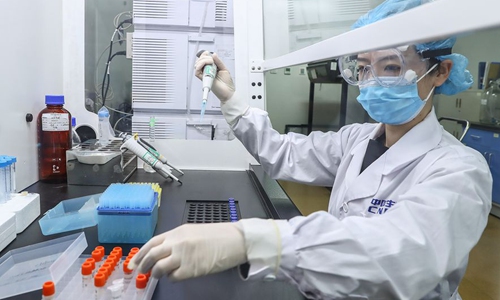Experts say side effect of COVID-19 vaccine tolerable, dismiss pessimism of West media reports
By Hu Yuwei and Leng Shumei Source: Global Times Published: 2020/7/7 23:48:40

Photo:Xinhua
Despite skepticism and pessimism from Western media, vaccine experts advised the public not to panic over the side effects revealed in the preliminary results of a Chinese-developed coronavirus vaccine as the adverse reactions exposed are tolerable and the vaccine is under constant optimization.
The appeal came after some Western media hyped the side effect ratio reported in early-stage clinical trials of the Ad5-nCoV recombinant novel coronavirus vaccine.
The vaccine against COVID-19, jointly developed by a military research team and Chinese biopharmaceutical firm CanSino Biologics, received approval for limited military use on June 29. The vaccine candidate became the first in the world to disclose complete phase one clinical trials results and declare a dual immune response in the recipients in May.
However, around 87 percent of the 108 participants reported at least one adverse reaction within the first seven days following vaccination. The most commonly reported systematic adverse reactions overall were fever (50 or 46%), fatigue (47 or 44%), headache (42 or 39%), and muscle pain (18 or 17%), according to data released by researchers on May 22 in the scientific journal The Lancet, with the researchers clarifying that "the most adverse events were mild to moderate, and no serious adverse event was noted within 28 days post-vaccination."
Adverse reactions are common after vaccination, and the released instances were not considered clinically significant by medical professionals. It is not powerful evidence that the vaccine failed to protect people, Tao Lina, a Shanghai-based vaccine expert, told the Global Times on Tuesday.
Some marketed vaccines, such as Diphtheria, Tetanus and Pertussis (DTP) combination vaccines used for children and toddlers, also reported frequent mild adverse events, said the expert. A study in 2008 revealed that an available DTP vaccine reveals adverse reactions including local reactions, systematic reactions such as fever over 38°C, drowsiness, loss of appetite, and vomiting.
"If babies and toddlers can tolerate these mild and regular adverse reactions, then adults can tolerate them without stress," he said.
"For surviving a deadly disease like COVID-19, a vaccine with a strong immune response is acceptable for most people even though it is accompanied by fever and some local adverse reactions for a limited period," Tao said.
A CNN report in May cited US medical experts saying that the results released by Chinese research team were not a good safety sign and they recommended that the CanSino researchers to give up their efforts.
"Calling to halt the trial is unreasonable as China is showing promise of developing a successful vaccine against the coronavirus," Tao said.
At least 19 vaccine candidates have entered clinical evaluations worldwide with seven of them from China, according to World Health Organization data updated on Monday.
The Ad5-nCoV vaccine is now under a collaborative plan to enter phase three clinical trials in Canada, and its phase two clinical trials results will be released soon, according to CanSino Biologics.
A Beijing-based immunologist who required anonymity told the Global Times on Tuesday that the vaccine needs to be improved to lower the adverse reactions, but he emphasized that it is still too early to finally determine the vaccine's safety and efficacy as the phase two results are not yet released.
CanSino Biologics has not given any official comments on concerns raised by the Western media upon Global Times' interview request, but stressed "all side effects so far are normal."
The Chinese volunteers who participated in phase one and two clinical trials have also objected to the Western media's reports overplaying the side effects of Chinese-developed vaccines. An 18-year-old volunteer for Ad5-nCoV Huang Shiyue told the Global Times on Tuesday that for the majority of volunteers in her group, fever had normally gone within 48 hours and other adverse reactions had disappeared by 14 days after injection.
Huang felt dizzy and experienced an increased heart rate as well as diarrhea after the shots, but recovered within a week.
"The research team informed us in detail of the potential adverse reactions before we were injected so we were less worried as everyone was well informed," Huang said. "The researchers kept track and were in close online contact with every volunteer about any reactions after the vaccination."
Posted in: SOCIETY,CHINA FOCUS